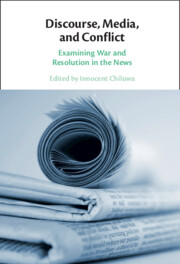Book contents
- Discourse, Media, and Conflict
- Discourse, Media, and Conflict
- Copyright page
- Contents
- Figures
- Tables
- About the Authors
- Foreword
- Introduction
- Part I Conflict Discourse in Newspaper Reporting
- 1 Elián González in the New York Times
- 2 The Construction of Threat of “Islamist Terrorism” in German Newspapers
- 3 “Herdsmen Are Terrorists”
- 4 Covering the War on Iraq
- Part II Electronic Media and Online Discourses of Conflict
- Part III Media Discourse and Conflict Resolution
- Index
- References
3 - “Herdsmen Are Terrorists”
Analyzing News Headlines on the Herder–Farmer Conflict in the Nigerian Press
from Part I - Conflict Discourse in Newspaper Reporting
Published online by Cambridge University Press: 21 April 2022
- Discourse, Media, and Conflict
- Discourse, Media, and Conflict
- Copyright page
- Contents
- Figures
- Tables
- About the Authors
- Foreword
- Introduction
- Part I Conflict Discourse in Newspaper Reporting
- 1 Elián González in the New York Times
- 2 The Construction of Threat of “Islamist Terrorism” in German Newspapers
- 3 “Herdsmen Are Terrorists”
- 4 Covering the War on Iraq
- Part II Electronic Media and Online Discourses of Conflict
- Part III Media Discourse and Conflict Resolution
- Index
- References
Summary
This chapter argues that the discursive construction of the herders as terrorists exacerbates suspicion and fear in herder–farmer relations and further destroys the prospect of peace in Nigeria. Applying a corpus-assisted critical discourse analysis to analyze the representations of the main actors in the conflict, 175 news headlines of seven popular Nigerian broadsheet newspapers were studied. The study reveals that the herdsmen are consistently constructed as terrorists, as violent actions such as unprovoked attacks and killings are attributed to them. However, the farmers are constructed as non-violent and as the victims. Hence, the press explicitly constructs the herder–farmer conflict in terms of the “killer-herdsmen” script with which the herders are generally evaluated.
- Type
- Chapter
- Information
- Discourse, Media, and ConflictExamining War and Resolution in the News, pp. 69 - 92Publisher: Cambridge University PressPrint publication year: 2022



